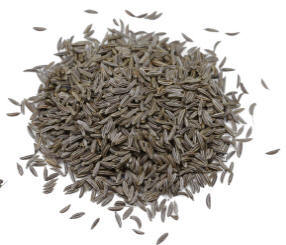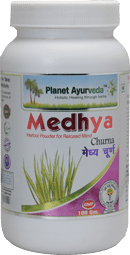Caraway (Carum carvi) - Properties, Benefits, Dosage
Description of Plant

Carum carvi is biennial plant belongs to Apiceae or Umbliferrae family. Appearance of Plant is similar to carrot plant with finely divided feathery leaves with thread like divisions, growing on 20-30 cm stem. The main flower stem is 40-60 cm long having small white or pink flowers in umbels. In India fruits consists of three different species- C. carvi (large and laterally compressed fruits), C. gracile (smaller and dorsally sub compressed fruits) and C. bulbocastanum (smaller and darker fruits). Caraway fruits are (also called seeds) crescent shaped achenes, around 2mm long, with five pale ridges. Its root is considered as tap root and grows in a slender form about 8-9 inches ling. It is yellow in color and when cooked it turns into rich creamy white color.
General Description
It is one of most common spice used in the Indian kitchens. It is used from ancient time and has great medicinal values. It is used in cooking to add taste and aroma. But we never think the therapeutic value of Jeera or caraway. As per Ayurveda all ingredients used in food are considered as medicine because it supports the body function. Let's discuss the general health properties of Krishna jeeraka.
It has various therapeutic properties like carminative, aromatic, stomachic, analgesic, stimulant and astringent. It is cooling in nature. Cumin is known as Jeeraka in Sanskrit which is derived from Jeerna means digestion. So, Jeerak means digest and it helps in digestive tract disorders.
According to Ayurveda it is considered as appetiser, stimulant, strengthening and good for eyes and brain and also improving lactation. It is also good for heart diseases, inflammations, vomiting, indigestion and chronic fever. It is bitter in taste, and light and dry in nature. Its potency is hot.
There are two different species used in the name of black cumin- Carum bullbocastanum / Bunium bulbocastanum - Black caraway and Nigella sativa - small fennel / simple nigella / Kalonji.
The seeds of kali jeera contains 40-60% volatile oil. The main constituents of essential oil are cuminaldehyde (45.4%) and p-cymene (35%) and minor constituents are carvone, limonene, a-pinene, beta- pinene, cymene and terpinene. Other constituents include flavonoids, quercetin derivatives, polysaccharides and calcium oxalate.
Its oil has various benefits like useful for hair growth, improves skin tone, and it also contains omega 6- linoleic acid, thymoquinone, nigellone, melanthin, nigilline, damascenine, and tannins. It is also helpful in treatment of erectile dysfunction by increasing the production of prostaglandin E.
The fruits are used in the baking industry, perfumery, and medicines and in some beverages preparations.
Caraway oil is used chiefly for flavoring wines, scenting soaps and in perfumes.
Classification
- Botanical name - Carum carvi
- Kingdom - Plantae
- Sub kingdom -Viridiplantae
- Division - Tracheophyta
- Class - Magnoliopsida
- Order - Apiaceae
- Genus - Carum
- Species - Carvi
- Order - Apiales
- Family - Umbelliferae
Habitat
This plant grows in north Himalayan regions. It is cultivated in plains during cold season and in hills like Kashmir, Chamba, Garhwal as summer crop at 3000-4000 meters attitude.
Names
- Latin name: Carum carvi
- Common name: Krishna jeerak, Kala jeera
- Sanskrit: Krishna jeeraka
- Hindi: Syahjeera, Kali jeera
- Kannada: Karijireege, Shahajirige
- Tamil: Karamjeeragam, Shimayishiraga
- Telugu: Sheemajilkar
- Malayalam: Karunjeeraka, Karinjeerakam
- English: Black caraway, Black cumin, Indian caraway
- Bengali: So-jeera
- Persian: Jeerya-riza, Zira
- Marathi: Shahaajire, Jeere
- Arabic: Kamuna, Kamoonearamani
- Espernato: Karvio
- Francais: Carvi
- Gujarati: Shaahjeeru
- Italiano: Carvi
- Kashmiri: Krihunzur
- Kurdi: Jaj
- Latina: Carecum
- Latviesu: Plavas Kirnene
- Magyar: Kormerry
- Nederlands: Karwij
- Norsk: Karve
- Origa: Kalajira
- Polski: Krninek Zwyezajrry
- Portugues: Alcaravia
- Punjabi: Zira Siyah
- Roman: Chirnan
- Shquip: Qumnoni
- Slovencina: Rasca, Kumina
- Suomi: Kumina
- Svenska: Kummin
- Urdu: Zirasiyah, Kalajeera
- Veneto: Kumo
Ayurvedic Properties
| Hindi / Sanskrit | English | ||
| Rasa | Katu | Taste | Pungent |
| Guna | Laghu, Rooksha | Physical Property | Light, dry |
| Virya | Ushna | Potency | Hot |
| Vipaka | Katu | Metabolic Property (After Digestion) | Pungent |
Effects on Doshas
It is Kaphavatahara that helps to pacifying the vitiated kapha and Vatadoshas and increases pitta doshas in body.
Classical Categorization
| Charak Samhita | Sushrut Samhita |
|
|
Ancient Verse about Carum carvi

The Bhavprakash nighantu, edition of 2010: verse 81-85, page no-30-32.
- It states that there are various synonym of jeerak are safedjeera, sayah or kalonji. Jeera, jeerak, jaran, ajaji, kana or deeraghjeerak are the different names of safedjeera. Krishanjeer, sugandh or udharshoghan are the names of syahjeera or kalajeera. Sushvi, kalika, upkalika, prithivika, karvi, prithvi, prithu, Krishna, upkunchika or brahmjeerak are the synonyms of kalonji.
- The second shalok states the therapeutic properties of jeerak are - ruchya, kturasyukt, agnideepak, deepan, javarnashak, pachak, vrushya, balkarak, pittkark, kaphnashak, Garbhashaya Vishuddhikrut, Chakshushya, Grahi, Sangrahi. Jeerak is pungent in taste and hot in nature. It is Kaphavatahara in nature that helps to balance the kapha and vatadoshas.
Reference:
The Bhavprakash Nighantu with elaborated Hindi commentary by Padmashri prof. K.C. Chunekar, edited by Dr. G.S. Pandey: edition of 1998: verse 81-85, page no-30-32.
Practical Uses of Carum carvi
- Vomiting - It is very useful remedy for treating liver and stomach problems.
- It is used as uterine disinfectant.
- It is useful in the treatment of inflammatory bowel syndrome (IBS) and indigestion.
- It is very effective in the treatment of jaundice.
- It acts as appetiser stimulant.
- It has anti-inflammatory properties as it increases the secretion of histamine.
- It is also helpful in dysentery, diarrhea, bloating or gas.
- It has anti carcinogenic action on breast because it contains sitosterol.
- It effectively treats the dysmenorrhea and irregular menstrual cycle by clearing the kapha from uterus.
- It is used as galactagogue that increases the milk secretion during lactation.
- It has calming effect on brain and nervous disorders. It enhances the brain power and concentration.
- It is good for eyes and helpful in headaches due to kapha dosha.
- It is useful in the treatment of gingivitis. Gingivitis is inflammation or swelling or redness of gums.
- It is used in the treatment of chronic stages of fever.
- It is used in disorders caused by disturbance of agni like anorexia, emesis, loss of appetite, flatulence, abdomen pain, haemorrhoids.
- It is also used as expectorant that promotes the secretion of sputum by the air passages and used to treat cough.
- It has property that stimulates the menstrual flow.
Part Used
Fruit, Seeds
Dosage
1/2- 2 gm
Ayurvedic Product from Carum carvi by Planet Ayurveda
Medhya Churna
Medhya Churna is useful for improvement of memory, concentration and stress relief. It is suitable for persons who keep forgetting, have cloudy thoughts and confused mind. This herbal formula is globally used as a nerve tonic which helps in enhancing mental clarity and concentration. It is an excellent formula for relieving anxiety and stress. It rejuvenates the nervous system.




